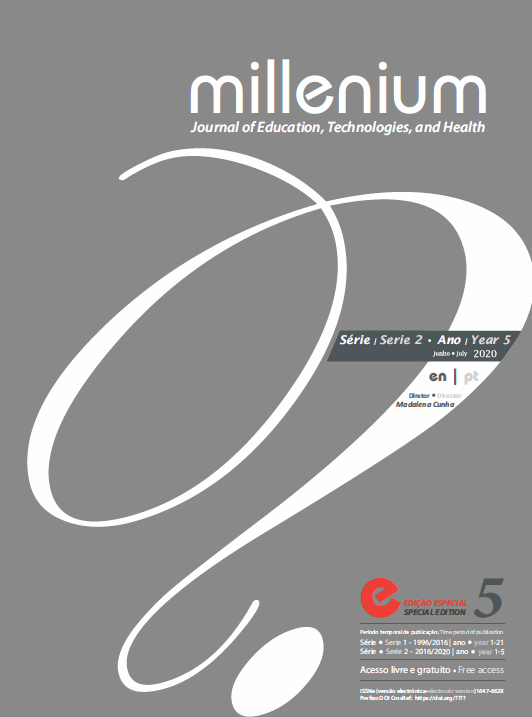Cognitive stimulation in people aged 65 and over
an exploratory study
DOI:
https://doi.org/10.29352/mill0205e.25.00310Keywords:
cognitive ability, seniors, mental healthAbstract
Introduction: Aging often progresses with the deterioration of intellectual functions, which include memory loss.
Objectives: Assess the cognitive ability of a group of elderly people, before and after, attending a cognitive stimulation program.
Methods: Cross-sectional exploratory study with a sample of 25 elderly people, aged between 65 and 76 years. Of these, 4 are male and 21 are female. The Mini Mental State Examination scale was applied at the beginning. and at the end of the implementation of the project “Envelhecer Ativa’mente”, to monitor participants' cognitive functions, before and after attending a cognitive stimulation program.
Results: The assessment of cognitive functions showed improvement in evocation function. Equal scores were obtained, for the two moments of evaluation, in the function’s orientation and attention and calculation. Equal scores were obtained, for the two moments of evaluation, in orientation, attention and calculation functions. In the remaining cognitive functions, there were no significant changes.
Conclusions: The results show clinical gains, considering that it is essential to continue the cognitive stimulation intervention plan. It is a challenge to continue the project and expand the target group to all people aged 65 and over, in the municipality of Tarouca, in order to improve and maintain the cognitive and functional capacity of the elderly.
Downloads
References
Cardoso, A. S., Cavol, A. L., & Vieira, C. J. (2007). Envelhecimento e atividade física na memória do idoso. EFDeportes.com: Revista Digital, 16(163). Acedido em https://www.efdeportes.com/efd163/atividade-fisica-e-o-idoso.htm
Cordeiro, J., Del Castillo, B. L., Freitas, C. S., & Gonçalves, M. P. (2014). Efeitos da atividade física na memória declarativa, capacidade funcional e qualidade de vida em idosos. Revista Brasileira de Geriatria e Gerontologia, 17(3), 541-552. Acedido em http://www.scielo.br/scielo.php?pid=S1809-98232014000300541&script=sci_abstract&tlng=pt
Folstein, M., Folstein, S., & McHugh, P. (1975). Mini-mental state: A practical method for granding the cognitive state of patients for the clinician. Journal of Psychiatric Research, 12(3), 189-198. DOI: https://doi.org/10.1016/0022-3956(75)90026-6
Guerreiro, M., Silva, A. P., Botelho, M., Leitão, O., Castro-Caldas, A., & Garcia, C. (1994). Adaptação à população portuguesa da tradução do mini-mental state examination (MMSE). Revista Portuguesa de Neurologia, 1(9), 9-10.
Morgado, J., Rocha, C. S., Maruta, C., Guerreiro, M., & Martins, I. P. (2009). Novos valores normativos do mini-mental state examination. Sinapse, 9(2), 10-16. Acedido em http://www.sinapse.pt/archive_detail.php?id=18
Portugal, Ministério da Saúde, Direção-Geral da Saúde (2012). Programa nacional para a saúde mental: Orientações programáticas. Lisboa. Acedido em https://www.dgs.pt/ficheiros-de-upload-3/programas-nacionais-prioritarios-saude-mental-pdf.aspx
Santana, I., Duro, D., Lemos, R., Costa, V., Pereira, M., Simões, M. R., & Freitas, S. (2016). Mini-mental state examination: Avaliação dos novos dados normativos no rastreio e diagnóstico do défice cognitivo. Acta Médica Portuguesa, 29(4), 240-248. Acedido em https://actamedicaportuguesa.com/revista/index.php/amp/article/viewFile/6889/4651
Schneider, R. H., Marcolin, D., & Dalacorte, R. R. (2008). Avaliação funcional de idosos. Scientia Médica, 18(1), 4-9. Acedido em https://pdfs.semanticscholar.org/8596/67dbfca3bb0215407c5344aeae23a38113e8.pdf
Spirduso, W. W., Francis, K. L., & McRae, P. G. (2005). Physical dimensions of aging (2th ed.). Champaign: Human Kinetics.
World Health Organization. (2002). Active ageing: A policy framework. Geneva: World Health Organization.
Downloads
Published
How to Cite
Issue
Section
License
Authors who submit proposals for this journal agree to the following terms:
a) Articles are published under the Licença Creative Commons (CC BY 4.0), in full open-access, without any cost or fees of any kind to the author or the reader;
b) The authors retain copyright and grant the journal right of first publication, allowing the free sharing of work, provided it is correctly attributed the authorship and initial publication in this journal;
c) The authors are permitted to take on additional contracts separately for non-exclusive distribution of the version of the work published in this journal (eg, post it to an institutional repository or as a book), with an acknowledgment of its initial publication in this journal;
d) Authors are permitted and encouraged to publish and distribute their work online (eg, in institutional repositories or on their website) as it can lead to productive exchanges, as well as increase the impact and citation of published work
Documents required for submission
Article template (Editable format)





